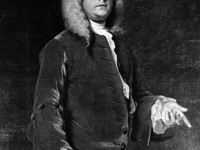William Brouncker’s Approximation of Pi
On April 5, 1684, English mathematician William Brouncker, 2nd Viscount Brouncker passed away. Brouncker introduced Brouncker‘s formula, a development of 4/π in a generalized continued fraction, and was the first President of the Royal Society. £1200 for a Peerage Brouncker was born in Castlelyons, County Cork, the elder son of William Brouncker, 1st Viscount Brouncker and Winifred, daughter of Sir William Leigh of Newnham. His father was created a Viscount in the…
Read more





















